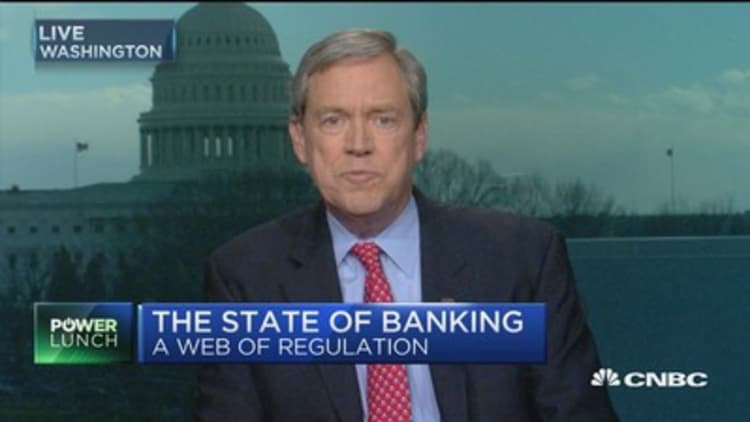
Banks have raked in nearly $1 trillion in profits since the financial crisis, but they paid a steep price along the way.
In total, financial institutions have paid $321 billion in fines related to the crisis, according to a study released this week by the Boston Consulting Group. U.S. banks have shouldered most of those costs, though global institutions also have been hit.
The release comes the same week the FDIC reported that bank profits surged to a record $171.3 billion in 2016, boosted by a best-ever $45.6 billion in the third quarter. The year's proceeds brought the total post-crisis net (measured from the third quarter of 2009) to $987.8 billion, according to FDIC records.
Nevertheless, the study notes that banks have paid heavily for the problems they created and face a tough landscape ahead.
"Managing these costs is a major burden for banks, requiring the creation of a strong non-financial-risk framework to avoid errors of the past," the Boston Consulting authors said.
Among the biggest obstacles to growth is a set of regulations that has averaged 200 revisions a day since 2011, the year Congress adopted the Dodd-Frank reforms. The legislation sought to reduce the possibility that institutions could become too big to fail and require the costly bailouts necessitated during the crisis.
Boston Consulting said a major challenge awaits in determining just how those big institutions will be unwound should they pose systemic risk.
"Relative to other areas of reform, resolution remains the least developed and most pressing," the report said. "There is still no consensus on how to close down (or unwind) banks or on which preparatory, structural measures might be needed."
The report noted that banking reforms will continue, despite the general anti-regulatory climate coming from the new U.S. presidential administration.
'Increased regulation is here to stay'
While President Donald Trump has been critical of Dodd-Frank, he also has lashed out at big banks as well. The general political consensus is that the White House will look for ways to ease conditions for community and regional banks while largely keeping the pressure on larger institutions. The lone exception to that may be elimination of the so-called Volcker Rule, which prohibits banks from trading for their own accounts.
"Increasing regulation is here to stay — much like a permanent rise in sea level as opposed to an incoming tide that will ebb," Boston Consulting said. "We expect this theme to hold despite recent political developments in the U.S. that may augur critical challenges to regulatory implementation."
The report calls for banks to work more closely with regulators to develop rules that make sense, and to focus on implementing technological changes to reduce costs and increase efficiency.



